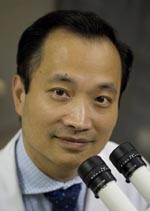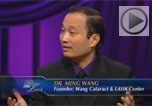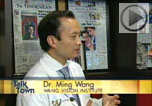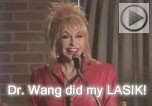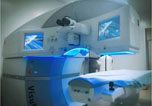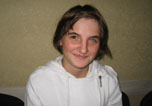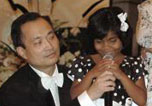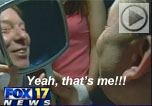- Over 55,000 LASIK and cataract procedures (including on over 4,000 doctors)
- The FIRST center in TN to offer Laser Cataract Surgery
- Introduced bladeless all-laser LASIK to the state
- Implanted the state's first FOREVER YOUNG™ Lens
- The first surgeons in the US to perform a new Intacs surgery to treat keratoconus
- Helped patients from 40 states and 55 countries
- International referral center for cataract surgery and LASIK complications
- Read Dr. Wang's book: LASIK Vision Correction
Why did you decide to have LASIK? Why did you choose Dr. Wang? How has your life changed since your LASIK procedure?
What is your advice for people considering LASIK?
Click to read more
| Article Library | Print This Page |
The World Is What You Make Of It
An interview with Ming Wang, MD, PhD--a world-class LASIK surgeon, researcher, philanthropist, musician and ballroom dancer--and his struggles growing up during the ten-year catastrophe in China
Wang Vision 3D Cataract and LASIK Center, Nashville, Tennessee
Ming Wang grew up during the ten-year catastrophe. Over a span of 10 years, from 1966 to 1976, most colleges were shut down, and millions of youth in China were deported for life to remote areas of China for “re-education”.
Had Ming continued his studies, he would have certainly been deported when he finished high school. Therefore, Ming’s parents made the agonizing decision to remove him from school after he graduated from junior high, so Ming’s education ended abruptly and painfully after ninth grade.
Faced with the devastating fate of deportation, the 14-year-old Ming began to play the er-hu, a Chinese violin that dates back over 1000 years. “I picked up this instrument in order to have a chance to escape deportation, since the government still had entertainment troops and they needed musicians. If you could play a musical instrument, then possibly they would allow you to stay in the city and not deport you. So in my teenage years, I picked up the er-hu, not for a hobby, but for the sheer need to survive!”
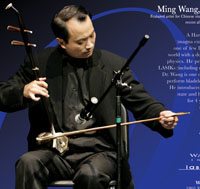
As he honed his skills with his instrument, Ming discovered a song that was written by a blind man--“Two Springs Reflect in the Moon”-- and the feelings evoked in the song resonated with Ming’s suffering soul. “I now realize why as a teenager I was able to relate so much to the sentiments of an older man who was blind (the composer). He could not see physically, and I could not see mentally and spiritually. So we were both blind in a sense; we shared that devastating fate.”
He practiced 15 hours a day on his er-hu, day and night, rain or shine. Through it, Ming voiced his longing for a chance to go to school and learn again, and his desire for a better life. Unfortunately for Ming, the government did not allow him to become a musician, so his plan of playing the er-hu to avoid deportation had failed.
Seeing Ming have to face deportation again and desperate in their struggle to save their child, Ming’s parents smuggled him into a Chinese University to study medicine. Hence at age 15, Ming began to study illegally, without any hope of ever becoming a doctor.
“I went to my father and asked him, ‘Why do I study medicine when I will never be allowed to become a doctor?’ To this day, I will never forget his reply. He said, ‘Knowledge is good and will always be useful.’ So I became a medical student secretly. I studied for about a year before the school discovered me, at which point I was expelled and stripped of even the chance of acquiring knowledge for the sake of knowledge.”
“Once again, deportation seemed inevitable. Then I met a young man two years my senior. His father was executed during the ten-year catastrophe for writing a play, and the young man was very bitter. We were both at the lowest point in our lives when we met. He wrote many poems and I taught myself music composition, so I was able to write music for many of his poems. One of our works was called “A Prisoner’s Song”, which expressed our desire as teenagers for freedom and the chance to study. None of our works was ever accepted by the government, nor allowed to be published.”
“When I was about to give up all efforts and accept the fate of deportation and a life of misery and poverty, China realized what a tragedy it had created for itself by deporting all of its youth for 10 years!”
“So one day, my father came home and said, ‘Son, I have something else for you to do now.’”
“I said ‘No, no, no, I don’t want to do it anymore; none of our plans have worked. No matter what I do, the government is going to deport me; I guess that is my fate.’”
“My father responded, ‘But this time is different; China is going to change. The ten-year catastrophe is finished. College entrance exams are going to start up again after 10 years of discontinuation, and now you finally have a chance to go to college, my son!’”
“But I had never been enrolled in senior high school since I had dropped out right after junior high, and I knew nothing about the studies of the tenth through twelfth grades. The college entrance exam was only a few months away, and only the top 3% of my graduating senior high school class would be accepted! I told my father, ‘You are crazy Dad, how can I possibly do that? Also, why should I jump ahead three years like this and take the college entrance exam right now?’”
“My father soberly replied, ‘Remember son, the Communist government shut off most of the colleges and prevented people from taking the college entrance examination for ten years until now. Who is to say that next year they are not going to stop it again for another ten years?! My son, this year might very well be the ONLY chance in your lifetime of going to college!’”
“So I had to study all the content of three years of senior high school in two months, AND score in the top 3% of that year’s senior graduating class. I asked my father again, ‘Are you crazy? How do I do that?’, to which he responded, ‘No problem, I have a way.’”
“My parents were doctors, and the teachers in many of the local high schools were their patients. So my father asked them if they would come and tutor me every day for two months, and in exchange, he would give them and their families free health care for the rest of their lives. So it was a deal. I ended up being drilled 15-18 hours a day for two months, in order to be prepared for the exam!”
“The efforts paid off and I got into the Chinese University of Science and Technology. In my senior year, I decided that I wanted to come to America. I had heard that an American professor was going to visit our school and give a lecture, so I pulled out my English textbooks and studied very hard the night before he was expected to come. The next day, after the American professor (Professor McNesby) gave his lecture, he asked, ‘Any questions?’ There I was, my hand raised very high. When he called on me, I stood up and asked him a question, but he did not understand it. It turned out that though I did study and prepare to ask this one question the night before, the book that I studied was a British English textbook, and my question was phrased in a British--not American--way of saying things. Professor McNesby asked me to explain, but I realized that I had practiced how to ask a question, but had not practiced how to listen to a question. So I just stood there, repeated my question over and over-- it must have been 8 or 9 times. Finally, Professor McNesby realized that my English was very poor and that I just barely knew how to ask this one question. He was finally able to decipher my question and answered it, but unfortunately I had no clue what his answer was! However, I felt I had accomplished my mission of asking the American professor a question! I believe Professor McNesby was very impressed by my persistence and tenaciousness because when he finished his lecture and was about to step off the podium, he pointed his finger at me and said, ‘This student, I want to see him in America.’”
“I came to the USA on February 3, 1982, with 50 dollars (borrowed) and an English-Chinese dictionary, knowing no one in this vast land but carrying with me a big American dream. I was dropped off at the Washington DC National Airport to begin my life in America!”
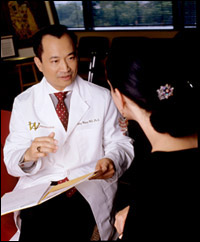 Today, Dr. Ming Wang is a Harvard and MIT graduate (MD, magna cum laude) and is one of the few LASIK surgeons in the world who holds a doctorate degree in laser physics. He has performed over 55,000 LASIK procedures, including on over 4,000 doctors. He published a paper in the world renowned journal Nature, holds a US patent for his invention of a new biotechnology to restore sight in the blind, and performed the world’s first laser-assisted artificial cornea implantation. He has restored sight in many terminally blind patients, including one who had been totally blind for 13 years and was told that he would never see again. Dr. Wang also founded a charity, the Wang Foundation for Sight Restoration, which has helped patients from over 40 states and 55 countries worldwide. He performs all sight restoration surgeries for these blind patients free of charge.
Today, Dr. Ming Wang is a Harvard and MIT graduate (MD, magna cum laude) and is one of the few LASIK surgeons in the world who holds a doctorate degree in laser physics. He has performed over 55,000 LASIK procedures, including on over 4,000 doctors. He published a paper in the world renowned journal Nature, holds a US patent for his invention of a new biotechnology to restore sight in the blind, and performed the world’s first laser-assisted artificial cornea implantation. He has restored sight in many terminally blind patients, including one who had been totally blind for 13 years and was told that he would never see again. Dr. Wang also founded a charity, the Wang Foundation for Sight Restoration, which has helped patients from over 40 states and 55 countries worldwide. He performs all sight restoration surgeries for these blind patients free of charge.
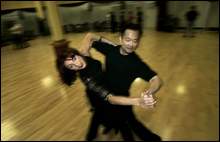 Ming is also an avid ballroom dancer, a hobby that he picked up while at Harvard Medical School. He is currently the reigning world championship finalist in the international ballroom 10-dance. Each year he hosts a gala to raise funds for the blind, with all doctors donating their medical services. At these annual events, he demonstrates the contrast between breathtakingly beautiful ballroom dancing and testimonials from blind patients to remind everyone about the preciousness of sight and our need to help the blind.
Ming is also an avid ballroom dancer, a hobby that he picked up while at Harvard Medical School. He is currently the reigning world championship finalist in the international ballroom 10-dance. Each year he hosts a gala to raise funds for the blind, with all doctors donating their medical services. At these annual events, he demonstrates the contrast between breathtakingly beautiful ballroom dancing and testimonials from blind patients to remind everyone about the preciousness of sight and our need to help the blind.
Ming’s er-hu playing has also become a wonderful hobby, and a well-known one at that. Recently he accompanied Dolly Parton for a song on her most recent CD “Those Were the Days”. It is believed to be the first time that the Chinese violin has been used to accompany American country music, as well as the first time an er-hu performer has collaborated with a country music legend. Dr. Wang formed a band called “Music for Sight” and plays his er-hu around the world, pro bono, with his friend Carlos Enrique on guitar, in an attempt to raise public awareness of the need to help the blind.
Ming Wang is an inspiration. He exemplifies what we are capable of when faced with the most dire circumstances. If we are willing to work hard and believe in God’s divine goodness and love for all of His children, then there really are no limitations, except those that we place on ourselves.
In Ming’s words, “God has a purpose in life for each of us. It may not be obvious to us what that purpose is at certain times. However, we do have to have faith and believe that He does have a purpose for us, because He does. We need to work hard, to the best of our capability, so that we will have the opportunity and joy of eventually knowing what God has in store for us.”
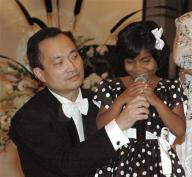 |
| Click to read Kajal's story |
Dr. Wang has learned many valuable lessons in life, some of which he summarized to be:
1) Treasure what one has, particularly the opportunity to study and learn, which is available to students in this wonderful country;
2) Listen to your elders, such as your parents and teachers, because they are older, wiser, have gone through more and know more about life; and
3) When opportunities present themselves in your life, go after them and always give them your best effort.
Dr. Wang has certainly done this and so much more.
For additional information about Dr. Wang, visit his websites, www.wangvisioninstitute.com
www.wangfoundation.com
Our new texbooks
A 501c(3) charity that has helped patients from over 40 states in the US and 55 countries, with all sight restoration surgeries performed free-of-charge.


